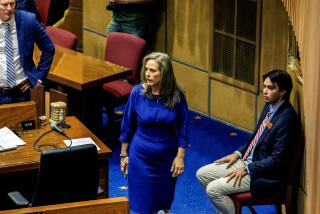NPR ANCHORS RISE ON POPULARITY OF THE BORK HEARINGS
- Share via
National Public Radio’s Nina Totenberg is intense, brainy and admits to a penchant for delivering closing arguments rather than one-liners. She’s an unlikely drive-time radio personality.
But for the last week, Totenberg and New York Daily News reporter Joe Volz have been anchoring what arguably is the best program on Los Angeles radio: the Robert Bork confirmation hearings.
Following on the heels of the Iran- contra hearings and, before them, William Rehnquist’s confirmation hearings as chief justice, gavel-to-gavel testimony before a panel of often eloquent, sometimes rude and frequently befuddled lawmakers has been, in the ears of some beholders, the best regular radio offering since “Burns and Allen.”
“I think Joe Volz and I are becoming cult figures,” Totenberg said wryly during a break Thursday in the marathon Senate Judiciary Committee hearings on Bork’s nomination to the U.S. Supreme Court. They resumed Friday and will continue Monday. Both KCRW-FM (89.9) and KPFK-FM (90.7) are carrying the coverage, though the KPFK version is not from NPR and does not feature the running Totenberg/Volz commentary.
Nevertheless, both stations report that the Bork hearings have been a hit with listeners.
“Just look at the quality of the witnesses,” said Zarubick Blair, KPFK’s continuity and traffic manager. “How often do you get a William Styron or a Laurence Tribe live on radio?”
Both the best-selling, Pulitzer Prize-winning author and the Harvard constitutional law professor appeared in opposition to Bork, but the range and eloquence of the lineup--both for and against the former solicitor general--has turned the hearings into what may be the most entertaining national civics lesson since Watergate.
“I don’t give a damn if nobody is listening,” said KCRW general manager Ruth Hirschman. “It’s far more important than the Iran-contra hearings (also carried gavel-to-gavel by both KCRW and KPFK). You have to ask yourself: Is it more important to hear what Laurence Tribe has to say or what (Iran-contra figure Retired Air Force Maj.) Richard V. Secord has to say? There’s no contest. It is fascinating because it’s about democracy.”
What unfolds each morning at 7 and often continues well into the evening is an unpredictable, intriguing dialogue that makes the Constitution accessible and contemporary, even as its 200th anniversary is being celebrated.
There’s conflict: Daily shouting matches between Sen. Joseph Biden (D-Del.), who opposes Bork, and Sen. Orrin Hatch (R-Utah), a Bork supporter.
There’s comic relief: Sen. Patrick Leahy (D-Vt.) noting for the record that one of his constituents believed the Supreme Court nominee was named Bjorn Bork.
And there’s suspense: Will Bork be confirmed--or not confirmed--in time for the first Monday in October, the traditional opening day of each annual Supreme Court session?
“The Iran-contra hearings seemed more TV-oriented,” Hirschman said. “But these hearings are really meant for radio because they represent thought more than image.
“You forget what majestic prose is or what moral conviction sounds like until you hear a Barbara Jordan, for instance. You are reminded of it when you hear her. When I’m not at the station I walk around with a headset on.”
“There was a tremendous interest in Contragate,” KPFK’s Blair said. “It was automatic, everyone was geared up for it and we had a lot of people burn out on them. Ironically, the Bork hearings are far more dramatic. There’s a lot more conflict. Party politics show through and I think people are finding the law very interesting.”
Totenberg, the longtime legal correspondent for NPR, admits her own fascination with the hearings but adds that she was not aware of what she was getting into.
“You’ve heard of the ‘Prisoner of Zenda,’ ” she said. “I’m the prisoner of Bork. I’m losing weight because they won’t let you have food or drink in the hearing room.”
At one point, following a 13-hour marathon session, the press corps exercised its constitutional right to petition by asking Biden’s committee to allow them at least to have coffee in the hearing room if they agreed to clean up after themselves. Their wish was granted, Totenberg said--perhaps demonstrating firsthand how well a constitutional democracy can function.
Both KPFK and KCRW do daily wrap-ups on the day’s hearings for those who aren’t glued to the speakers during the morning freeway commute. The KPFK wrap-up airs at 5 p.m., usually with a conservative and a liberal facing off in their own debate over the issues raised during the day.
“We’ll have someone like Ramona Ripston from the American Civil Liberties Union up against someone from the Washington Legal Fund, which is a conservative group in Washington, D.C.,” Blair said. “We try to match people of equal standing.”
KCRW’s wrap-up is less a debate and more a summation by Totenberg and Volz.
“I guess it is a national civics lesson,” Totenberg said. “When witnesses mention a case name, I spend about 10 minutes describing lower case disputes and the arguments on both sides and a summary of the decision. I kind of become Judge Totenberg.”
More to Read
Sign up for Essential California
The most important California stories and recommendations in your inbox every morning.
You may occasionally receive promotional content from the Los Angeles Times.










